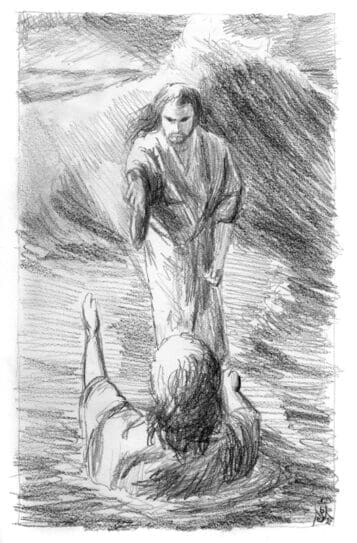Secret meeting with Jesus on the shore
By LORRAINE V. MURRAY, Commentary | Published April 14, 2022
I’m often tempted to tell folks who only come to church on Easter: “Stick around–there are amazing events that happen after the Resurrection.” For example, some of the apostles encounter the risen Christ on the shore of the Tiberian Sea, after they’ve been fishing all night.
They don’t recognize him at first, until he says “Cast the net over the right side of the boat and you will find something.” When they do this, they can barely pull the net in, because it’s so full of fish. “It is the Lord!” John says excitedly, and the boat heads toward the shore.
 Peter, however, can’t wait to see Jesus, so he dives into the water and swims to shore. I love this man, because he is remarkably down to earth and impulsive. He was the one who left the same boat during a storm, when he saw Jesus walking on water. He was confident he wouldn’t drown, until he started to doubt, and then he went under.
Peter, however, can’t wait to see Jesus, so he dives into the water and swims to shore. I love this man, because he is remarkably down to earth and impulsive. He was the one who left the same boat during a storm, when he saw Jesus walking on water. He was confident he wouldn’t drown, until he started to doubt, and then he went under.
Peter also has a tendency to blurt out remarks without thinking them through, which makes me love him even more, since I excel at this trait. For example, when Jesus predicted the crucifixion, Peter was horrified and said, “God forbid, Lord!”
Wouldn’t we say this too if a friend talked about being brutalized and killed? But Jesus was none too pleased with Peter’s reaction: “Get behind me, Satan! You are an obstacle to me. You are thinking not as God does, but as human beings do.”
When Jesus prepared to wash the apostles’ feet, Peter was the only one who protested. He was the only one who promised he would never, ever deny Jesus, and then did just that, three times, while warming his hands over a charcoal fire.
It’s likely that Peter felt terrible about breaking that promise and longed for time alone with Jesus. Because the boat was dragging a heavy net, he figured he could beat it to shore. Scripture doesn’t tell us what happened during this secret encounter, but I picture Peter running to Jesus and embracing him and saying, “I’m so sorry I denied knowing you!”
When the other disciples arrive, Jesus cooks fish and bread over a charcoal fire for everyone, and invites them to eat. This is a beautiful example of his words: “I have come not to be served, but to serve.” Imagine enjoying a meal cooked by the Son of God!
After breakfast, a crucial dialogue occurs. “Do you love me more than these?” Jesus asks Peter. “Yes, Lord, you know that I love you,” Peter replies. Then Jesus says, “Feed my lambs.”
Jesus asks again, “Simon, do you love me?” and the answer is the same. “Tend my sheep,” Jesus says. When Jesus asks a third time, Peter gets distressed. “Lord, you know everything; you know that I love you!” And Jesus says, “Feed my sheep.”
Jesus gives Peter a chance to profess his love three times, thereby showing mercy and forgiveness for his denials. He also gives Peter a mission, which becomes the hallmark of Christianity, based on the words in Matthew’s gospel: “I was hungry, and you gave me to eat; I was thirsty and you gave me to drink.” Those who love the Lord must tend his precious flock.
Jesus invites us to the wedding feast of the Lamb at every Mass, where we encounter him like Peter did, quietly and alone. We can tell him our secrets, admit our denials and ask his forgiveness. We can embrace the Lamb of God, the gentle one who died for us, and tell him: “Lord, you know that I love you!”
Artwork is by Jef Murray (www.jefmurray.com). Lorraine’s email address is lorrainevmurray@yahoo.com.